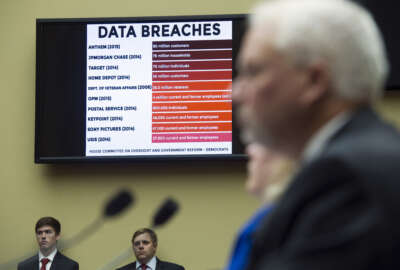Federal lawsuit over 2015 OPM breach seems all but wrapped up
In today's Federal Newscast, news on a potential multimillion dollar settlement for victims of the Office of Personnel Management hack.
To listen to the Federal Newscast on your phone or mobile device, subscribe in PodcastOne or Apple Podcasts. The best listening experience on desktop can be found using Chrome, Firefox or Safari.
- The American Federation of Government Employees files another complaint on return to office plans. The union expresses more concerns about health and safety protocols at the Equal Employment Opportunity Commission. AFGE recommended bringing EEOC employees back to the office in a phased approach based on local COVID-19 transmission levels, but the union said the agency implemented a generalized return to office plan last month, before finishing negotiations. The EEOC said it’s monitoring local COVID-19 conditions and requiring masks in the office in counties with high transmission.
- A union for Foreign Service officers is raising questions about the role artificial intelligence plays in assessing new recruits. The American Foreign Service Association is seeking answers on how the State Department will use AI algorithms to make a first pass on candidates seeking to join the Foreign Service. Once the AI algorithm screens candidates, active-duty members of the Foreign Service and members of the public, will review the slate candidates and decide who goes forward with the oral exam. AFSA President Eric Rubin said it now receives about 6,000 applications a year, but he said even that’s still too many applications to manually review. (Federal News Network)
- A former Office of Management and Budget director sends a stark warning to federal employees about violating spending laws. Russ Vought, the former OMB director during the Trump administration, is warning that the Biden administration’s effort to promote voter registration at federal facilities could put employees in jeopardy of violating the Anti-Deficiency Act. Vought wrote to current OMB Director Shalanda Young yesterday detailing his concerns. He said OMB needs to be more transparent with agency plans for implementing the president’s March 2021 executive order on promoting access to voting. Federal budget experts, however, say Vought’s concerns may be overstated as violating the Anti-Deficiency Act usually requires more specific direction than Congress typically gives to agencies. (Federal News Network)
- Add the Labor Department’s unemployment insurance program to the list of Covid-19 related victims. The UI program’s persistent programs, including the large amount of fraud, waste and abuse it suffered from over the last two years landed it on the Government Accountability Office’s high-risk list. GAO said problems with customer service, timely claims processing and the implementation of new programs became evident during the pandemic and demonstrated that UI needed more oversight and attention. GAO said the program’s improper payment rate more than doubled in 2021 as compared to 2020 to 18.9%. GAO now has 38 programs on its high risk list.
- News on a potential multimillion dollar settlement for victims of the Office of Personnel Management hack. A D.C. federal judge this week preliminarily approved a $63 million settlement as part of a class action lawsuit brought by victims of the breach into OPM databases. The breach was uncovered in 2015. By then, hackers had stolen the records of nearly 22 million current and former federal employees. The Chinese government is widely thought to be behind the attack. The proposed settlement would only compensate those who can prove they were financially affected by the breach. The court’s order set a Dec. 23 deadline to submit a claim.
- The Federal Retirement Thrift Investment Board is working to resolve issues with the Thrift Savings Plan’s new website. The TSP board added 185 new customer service representatives to handle record high call volumes and long hold times. That’s as some TSP participants experience technical issues and missing financial information, after a major update to the “My Account” website. The board said participants now have access to year-to-date contributions. Almost 90% of TSP participants have logged in successfully. (Federal News Network)
- The Department of Housing and Urban Development, NASA and the Department of Homeland Security are among many agencies looking to strengthen equity in federal leadership roles. At “HUD,” 54% of senior executives are women, compared with 36% governmentwide. “HUD” Deputy Secretary Adrianne Todman said to further improve diversity and equity in leadership, the agency develops internal talent and partners with affinity groups. That comes as the Partnership for Public Service launched a new leadership institute to develop employee skills and improve public trust in government.
- The CXO Fellows Program is back this year for 100 new federal leaders. CXO fellows are GS-9 to GS-13 leaders stationed in the Washington area who specialize in acquisition and procurement, financial management and budget, human capital, information technology and data. The free, yearlong professional development program has been running since 2014. Fellows will meet three times a month during the virtual program to discuss leadership, cross-functional and interagency collaboration and career development. Applications to the CXO Fellows Program are due on Friday.
- Air Force Gen. Anthony Cotton is nominated as the next chief of U.S. Strategic Command. In that role he will responsible for the United States’ nuclear arsenal. If confirmed, Cotton will take over the position from Navy Admiral Charles Richard. Cotton is currently serving as commander of Air Force Global Strike Command at Barksdale Air Force Base, Louisiana.
- Military service members are closer to a big pay raise next year, but it could get bigger. A House panel agreed to add a 4.6% pay raise for military service members to the 2023 defense authorization bill. That bill has made it into law every year for the last six decades. However, with rising inflation rate, lawmakers are wondering if that pay raise is enough. Congressional staff members said they are keeping a close eye on inflation rates and how service members are being affected. The aides said lawmakers are not ruling out the possibility of making the military pay hike even higher next year to offset price increases. (Federal News Network)
- Food insecurity affected one in five military families as of last year. That’s up from one in eight in 2019. It’s an issue that’s been around for decades but the Defense Department hasn’t directly studied food insecurity among service members and veterans until now. While new data is expected in October, groups that have researched the issue have plenty of ideas for short-term solutions. These include changing the eligibility of SNAP benefits, combatting the stigma around food insecurity, and making sure lower-ranking service members know about assistance programs sooner. (Federal News Network)
- The Army is unveiling the military’s first solar arrays as the newest method to combat climate change. The 1.1-megawatt array is floating on Big Muddy Lake at Fort Bragg’s Camp Mackall. In North Carolina 1A megawatt can power around 21 hundred homes. Fort Bragg also opened a new electronic recloser, to better protect power lines and minimize damage during power outages. The Army is opening these new methods during President Joe Biden’s National Ocean Month, which calls attention to the importance of minimizing climate change. Biden released the first ocean climate action plan yesterday and suggested steps to minimize and stop distributing single-use plastic products in national parks.
- The Interior Department is planning to eliminate out single-use plastic products at national parks by 2032. Interior Secretary Deb Haaland is directing the agency to begin phasing out disposable plastic bags, food containers, bottles, straws, cups, and cutlery. In their place, Haaland said the agency will seek compostable and biodegradable materials, as well as 100% recycled materials. This marked just one of several agencies’ policies the Biden administration announced in recognition of World Ocean Day.
- The Department of Homeland Security is rolling out a new mobile application for intelligence sharing. The app, DHS Intel, is designed to share intelligence with law enforcement and first responders across the country. Users will need a Homeland Security Information Network account to access the application. DHS said it will provide more timely info compared to email bulletins and websites designed for desktop computers. The app is currently available in Apple’s App Store, while it’s expected to hit Android’s App Store later this summer.
Copyright © 2025 Federal News Network. All rights reserved. This website is not intended for users located within the European Economic Area.
Eric White
Eric White is news anchor and Federal Drive producer at Federal News Network.
Follow @FEDERALNEWSCAST
Related Stories
OPM has yet to fix issues with contracts to help 2015 data breach victims
Related Topics
All News
American Federation of Government Employees
Anthony Cotton
Anti-Deficiency Act
Cybersecurity
Data Breach
Department of Homeland Security
diversity equity inclusion and accessibility
Equal Employment Opportunity Commission
Federal Drive
Federal Newscast
Federal Retirement Thrift Investment Board
food insecurity
Foreign Service
Government Accountability Office
Interior Department
Labor Department
military families
Office of Management and Budget
Office of Personnel Management
Russ Vought
Shalanda Young
Supplemental Nutrition Assistance Program
Technology
Tom Temin
Workforce






